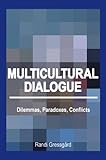Multicultural Dialogue : Dilemmas, Paradoxes, Conflicts / Randi Gressgård.
Material type: TextPublisher: New York ; Oxford : Berghahn Books, [2010]Copyright date: ©2010Description: 1 online resource (190 p.)Content type:
TextPublisher: New York ; Oxford : Berghahn Books, [2010]Copyright date: ©2010Description: 1 online resource (190 p.)Content type: - 9781845456665
- 9781845458201
- 305.8001 22/eng
- HM1271
- online - DeGruyter
| Item type | Current library | Call number | URL | Status | Notes | Barcode | |
|---|---|---|---|---|---|---|---|
 eBook
eBook
|
Biblioteca "Angelicum" Pont. Univ. S.Tommaso d'Aquino Nuvola online | online - DeGruyter (Browse shelf(Opens below)) | Online access | Not for loan (Accesso limitato) | Accesso per gli utenti autorizzati / Access for authorized users | (dgr)9781845458201 |
Browsing Biblioteca "Angelicum" Pont. Univ. S.Tommaso d'Aquino shelves, Shelving location: Nuvola online Close shelf browser (Hides shelf browser)
Frontmatter -- Contents -- Preface -- Introduction -- Chapter 1 Dual Subjectivity and the Metaphysics of Purity -- Chapter 2 Non-modern Holism and Modern Totalitarianism -- Chapter 3 Heterogeneity and the Singular Subject -- Chapter 4 Consequences of Heterogeneity -- Chapter 5 Conditions for Dialogue -- Notes -- References -- Index
restricted access online access with authorization star
http://purl.org/coar/access_right/c_16ec
As cross-cultural migration increases democratic states face a particular challenge: how to grant equal rights and dignity to individuals while recognizing cultural distinctiveness. In response to the greater number of ethnic and religious minority groups, state policies seem to focus on managing cultural differences through planned pluralism. This book explores the dilemmas, paradoxes, and conflicts that emerge when differences are managed within this conceptual framework. After a critical investigation of the perceived logic of identity, indicative of Western nation-states and at the root of their pluralistic intentions, the author takes issue with both universalist notions of equality and cultural relativist notions of distinctiveness. However, without identity is it possible to participate in dialogue and form communities? Is there a way out of this impasse? The book argues in favor of communities based on nonidentitarian difference, developed and maintained through open and critical dialogue.
Mode of access: Internet via World Wide Web.
In English.
Description based on online resource; title from PDF title page (publisher's Web site, viewed 25. Jun 2024)









